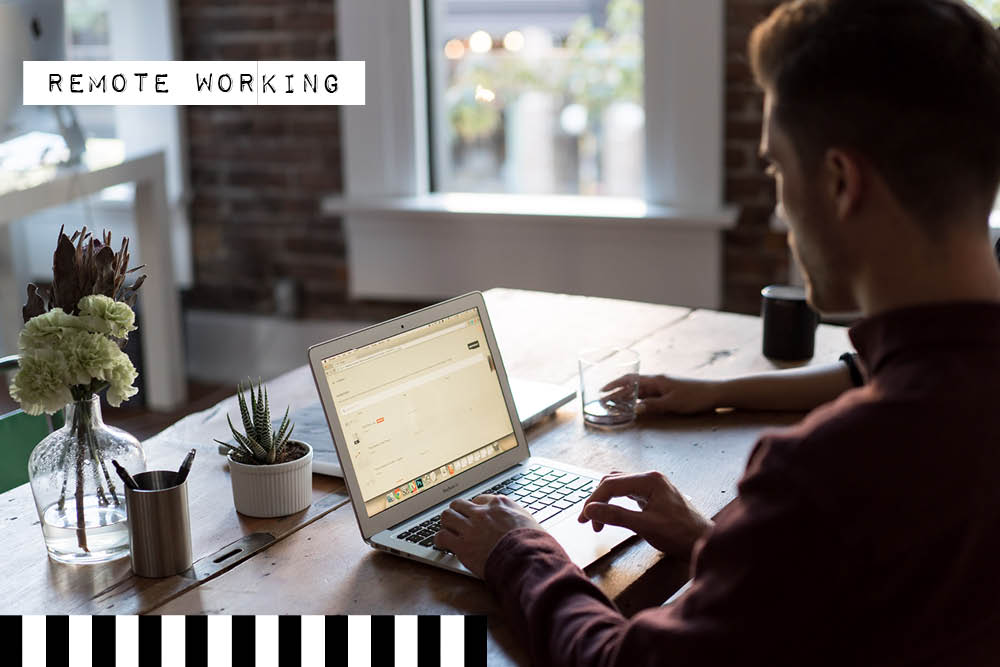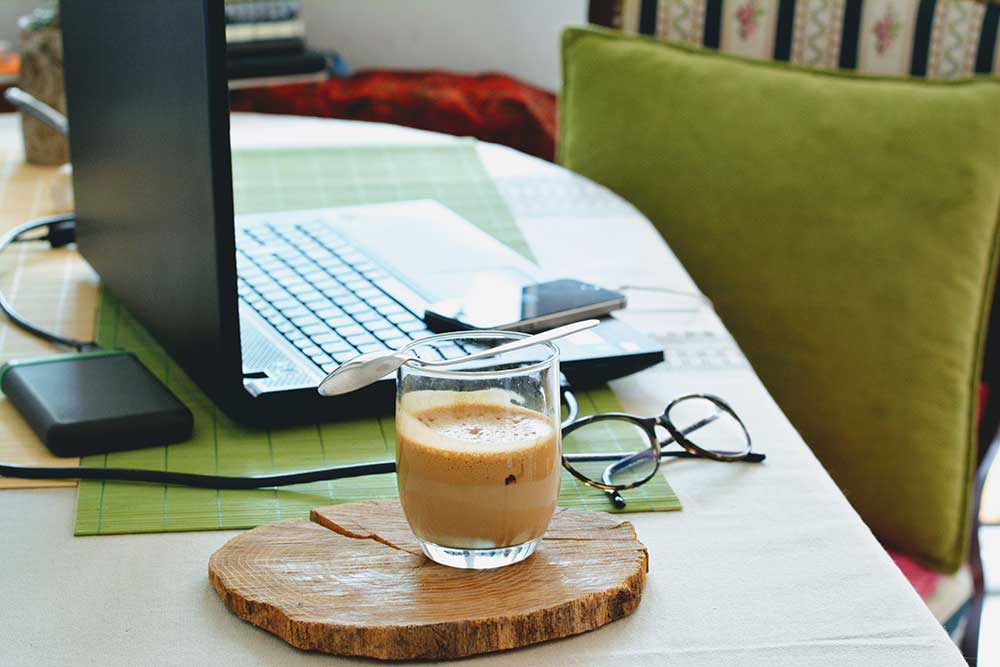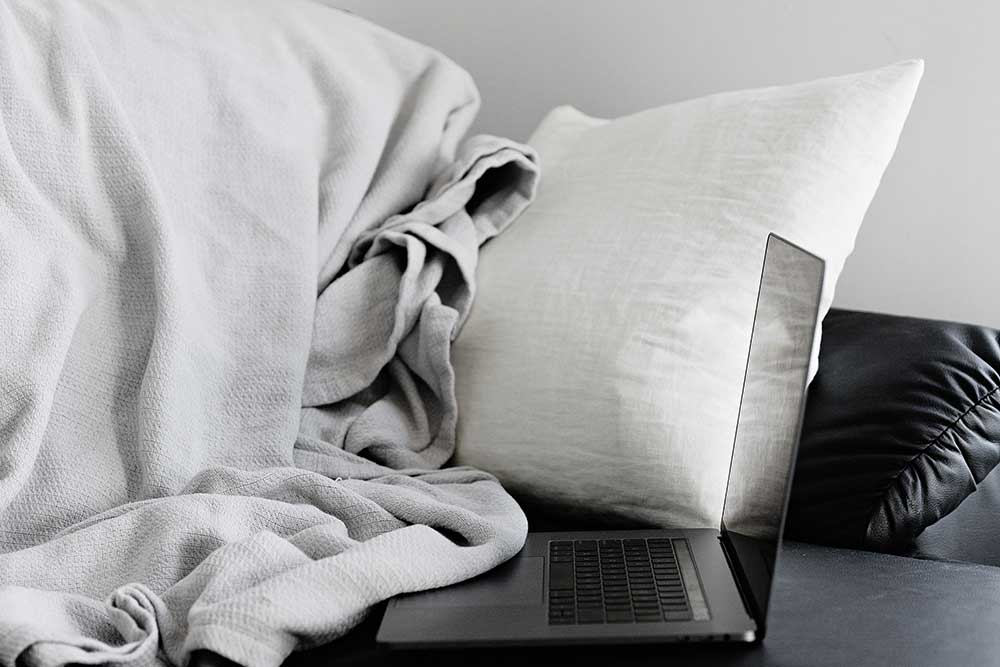What working from home means for you

For many businesses, home or flexible working is a pursuit that has been actively encouraged. Let’s face it, work was invented before the internet, so it makes sense that now we’re all super-connected individuals, we can conceivably work from anywhere. Typical places for this have varied over the years: some have chosen the front room, a coffee shop with decent wifi connection (and not-too annoying clientele), the kitchen, library or, if you’re feeling particularly bouji, a private workspace.
An IWG Global Workplace survey in 2019 found that 68 per cent of businesses in the UK had a flexible working policy. Certainly in the last 10 years, flexi working has risen significantly, and 73 per cent of those surveyed now consider it to be the new normal. It may seem paradoxical that businesses would let employees work from home. However, even the most staid of institutions have taken the lead from big tech firms such as Google, Facebook and Microsoft, who regularly allow their employees to work out of the office. Not only has it been a boost for these tech savvy organisations, but also for professions such as the telecoms industry.
Employees have chosen to forgo long commutes and take advantage of the new advances in technology, video conferencing and VPN networks. Companies and professions like these believe that flexible working gives people a better work/life balance, which in turn boosts the positivity and, in turn, the productivity of staff. A survey by Flexjobs of 3,000 people found that for 77 per cent of those questioned, working from home had improved their overall health and wellbeing. This figures: being able to get on with your daily tasks without commuting, interruptions, distractions or listening to the sales department discussing whether The Irishman was an hour too long can be hugely beneficial.
THE ADDED BENEFITS OF REMOTE WORKING
It also leads to a greater sense of independence and, in turn, wellbeing. A happy worker is a productive worker, who’s invested in their tasks. A 2019 study by Airtasker reinforced this view, showing that those who worked from home “worked 1.4 more days every month, or 16.8 more days every year” than their office-based peers.
Another positive for working from home is that it’s actually better for the environment. It stands to reason that the less people leaving the house puts less strain on local transport, results in fewer resources being consumed, and takes more cars off the road. A Global Workplace Analytics survey from 2019 found that if people with remote professions worked at home for even half the time, it would save 119 billion miles of motorway driving. That’s the equivalent of taking 10 million cars off the road.
Remote working is also seen as a way to reduce “presenteeism”, where employees turn up to the office, but are regularly withdrawn, less engaged and therefore less efficient. We’ve already seen how being flexible allows workers to be more productive. Working from home is seen as a route to engender trust between a business and an employer, and give them greater independence.
Commenting on a 2018 CIPD/Simplyhealth survey, Pam Whelan, director of corporate at Simplyhealth explains: “In order to tackle these unhealthy work practices [such as presenteeism], we would encourage employers to invest in a wider health and well-being approach that is embedded into their culture and one that supports a preventative approach to employee health and well-being.”
DON’T BE A ‘WORK CREEP’
On the face of it, working from home should be the best of both worlds. You get to eat what you like, sit wherever you want, even watch whatever you like at lunch, and still put in a good day’s work. Regular freelancers decry these upbeat descriptions, but at the very least, the sense of freedom can be liberating for many. As hinted above though, it doesn’t come without problems.
For many people, working from home means that the line between “on” and “off” time becomes increasingly blurred, especially for those with extra commitments such as looking after a relative or caring for their children. Some may find that going to care for an unwell mother, say, or picking up a child from school may eat into the working day.
A joint study between Eurofound and the ILO on ICT/Mobile work for the EU28 countries in 2015 found that 48 per cent of men, and 39 per cent of women reported working in their free time to meet the daily demands of their work. This causes workers to pick up their computers after hours in the evening to complete unfinished daily tasks, resulting in a knock-on effect of reduced leisure time and relaxation before bed.
The link between problems with sleep and late-night exposure to blue screens is well documented, but at the very least, it still impacts upon a person’s downtime. So what at first looks to be a professional utopia, can actually turn into a stressful experience and severely damage a worker’s wellbeing.
There are ways however that remote workers can enforce these boundaries and avoid “work creep”. Even simple things such as setting a morning routine and working at specific times helps you organise your day, and stay more efficient. Performance strategist Abigail Ireland highlights her ways of being more productive when working from your own space.
A BOOST IN PRODUCTIVITY
“To create effective boundaries, designate a physical location within your home for ‘work’. This could be a particular area of the home, dedicated room, or even a specific seat at the table. Helping your brain to quickly shift into work mode when in this location enables you to focus and get in the zone. It also means the rest of your home stays associated with rest and relaxation, rather than being a reminder of work.”
Abigail also identifies a helpful tip, to help start your working time with solid intent. “Spend the first hour each day doing the one task that you keep avoiding but that is going to make a big impact. This usually falls into the “important but not urgent” bucket. Use the time you would otherwise spend commuting to make solid progress on this task.”
Being able to complete tasks that we often avoid or find difficult can help boost our wellbeing. Completing them can also lift our sense of anxiety, as having a constant “to-do list” that we’re never able to tick off can clutter our mind, cloud our emotions and impair our relationships with others, as our frustrations can lead us to be short tempered or agitated.
It’s a definite positive though to invest in a regular workstation and comfortable office furniture. This means you can feel more professional at home instead of being perched supinely on the sofa, laptop balanced precariously on your hips. Likewise, dress as if you were going into the office. Doing this engenders a positive mindset and helps you focus on the task in hand.
Use your lunch hour to take a short walk, even if it’s round the block or to grab a quick coffee. Exposure to the outside world is necessary even when you’re at home, as this will help reset yourself and clear your mind. You can even build in a quick bout of exercise, such as running or a brisk walk, which has been proven to increase feel-good hormones and boost wellbeing. Use productivity apps such as Toggl to keep a track of how long you’ve been working on a particular day or project. For those flexible workers who live on their own, or without a partner or loved ones surrounding them, working from home can have unintentional negative consequences.
WORKING ALONE DOESN’T HAVE TO BE LONELY
In a survey conducted by Buffer, the content and marketing suite which recruits freelancers or digital nomads, 19% of remote workers surveyed said they regularly struggled with loneliness. Lee Chambers, a former sports nutrition developer, describes his experience with working remotely: “I used to work in an office, but would actually prefer working alone at home for a lot of the time. However, I then became ill, and lost the ability to walk. At this time, I was going through walking rehab and physio so it made it easier to be flexible with all my appointments. My wife was on maternity leave and my children were at home, which took the edge off feeling isolated. But then my wife went back to work after six months and my children were looked after by grandparents.
“I started to struggle mentally, feeling disconnected and this led to me starting to eat poorly, neglecting my self care more then I would have, and being emotionally volatile. My mood was often low and I rarely got out to see my friends, and wasn’t pursuing my hobbies. After a few months and feeling really low and dark, I went to the doctors and was referred for counselling. This helped me see that I was isolating myself more than I should have been, and that I had this limiting belief that I wasn’t a people person and was happier on my own. We are a social species at the end of the day! I now run Essentialise Workplace Wellbeing, where I coach remote, home, and self employed workers how to look after their physical and mental wellbeing and build systems to become highly productive using environmental psychology. I also rent an office, so I don’t fall into the trap I have done before and have a social environment for support to work in.”
TIPS AND TRICKS OF THE TRADE
Stories like these are all too familiar, so how can we avoid times like this and tumbling into a spiral of low moods or depression? Hannah Martin is a psychotherapist, hypnotherapist and NLP practitioner, and advises what you can do to protect your mental health if you feel lonely and isolated when working from home. She explains that the key to protecting yourself from entering into states of low moods lies in meeting our basic emotional needs. “The good news is that you don’t need to go to any great lengths to find outlets for your emotional need. Talking to friends and family on the phone and meeting when you can is important. So why not talk about organising a period when you’re able to indulge in shared interests? Books clubs, the theatre, cinema, exercise – whatever activities you enjoy! Having dates in your diary to look forward to is a real mood-lifter.
“Or you could volunteer, or joining a team or committee also helps to satisfy several emotional needs. Is there a local charity close to your heart that needs help? Or perhaps there’s a local sports team or club you can assist with? Activities like these all contribute to the ‘helper’s high’ that some experience when being able to make a difference to other’s lives,” she says.
“Even just going about your normal day gives you opportunities for interactions that may seem trivial but all contribute to your wellbeing. Getting to know the people you see regularly in your local community – say hello to fellow dog walkers, shop assistants, and even lollipop ladies or men you pass – gives you a sense of belonging, meaning and community that can be lacking when you’re sat lonely behind your desk at home.”
Hannah believes that while you may be physically “alone” when working from home, there are still many opportunities to create meaningful connections with other people, however fleeting, that will inoculate you against loneliness and help boost your mental health.
At times when working from home becomes more commonplace, striking a balance between being focused and productive, but happy and open to human connection has never been more important. Try to notice when you’re entering a state or period of low moods, and keep talking to friends or family about how you feel. As my six-year-old daughter always likes to remind me: “Sharing is caring”.












